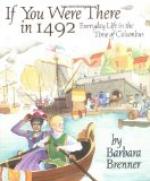the island; and the contingency of hurricanes was
not provided for. Besides, the governor believed
that this prediction of a hurricane was a mere pretext
of the admiral’s for obtaining admission to the
harbour. To an eye unaccustomed to tropical changes,
the weather appeared to be “set fair.”
Scarcely a ripple passed over the sea; scarcely a breath
stirred the luxuriant foliage on shore. Ovando
repulsed with scorn the admiral’s suggestion
that, at any rate, the departure of the fleet for Spain
should he delayed. This fleet was the richest
in cargo that had ever left the islands. It contained
all the gold which had been wrung out of the natives
by Bobadilla’s harsh measures. Of one nugget,
especially, the old chroniclers speak in the most
glowing terms. According to them, it was the
largest piece of virgin gold ever discovered.
It had been found accidentally, by an Indian woman
at the mines, while listlessly moving her rake to
and fro in the water one day during dinner time.
Its value was estimated at 1,350,000 maravedis;[About
416 English Pounds] and in the festivities which took
place on the occasion, it was used as a dish for a
roast pig, the miners saying that no king of Castile
has ever feasted from a dish of such value. We
do not find that the poor Indian woman had any part
in the good fortune. Indeed, as Las Casas observes,
she was fortunate if she had any portion of the meat,
not to speak of the dish. Bobadilla had purchased
the nugget for Ferdinand and Isabella, and had shipped
it with other treasure valuable enough to go a long
way towards compensating the sovereigns for all their
expenditure on the new colony—if the fleet
could only reach Spain in safety.
But on the second day after its departure the Admiral’s
prediction became terribly verified. A tornado
of unexampled fury swept over the seas; and those
on shore could judge of the fate that was likely to
befall the unfortunate squadron, as many of the buildings
and trees on the island were levelled with the ground
by the force of the tempest. Of all the ships,
only one—and that the frailest of the fleet—was
able to accomplish the voyage to Spain. A few
vessels managed to return, in dire distress, to the
island; but by far the greater number foundered at
sea. The historians of the period do not fail
to remark that, while the ship which reached Spain
safely was the one carrying the admiral’s property,
a special providence decreed that his enemies—Bobadilla,
Roldan, and their associates in cruelty and plunder—should
perish with their ill-gotten gains.
Like Cassandra, Columbus witnessed the discomfiture
of the disbelievers in his prophecy: like her
he was denied the right of sanctuary upon the occurrence
of the disaster which he had foretold. Repulsed
from port by Ovando, however, the admiral sailed along
the coast, and succeeded in bringing his own ship
under the lee of the land when the storm came on.
But the three other caravels were in no little danger
(particularly the disabled one, which was commanded
by the Adelantado), and some days elapsed before the
little squadron was re-united in the port of Azua,
to the west of San Domingo.




